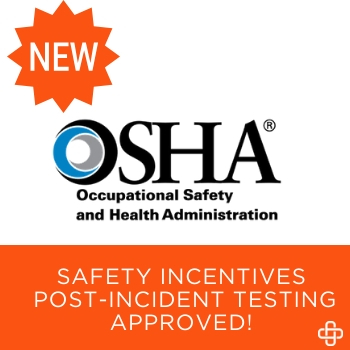 At last, new guidance has been issued by the Occupational Health and Safety Administration (OSHA) regarding safety incentive policies and post-incident testing.
At last, new guidance has been issued by the Occupational Health and Safety Administration (OSHA) regarding safety incentive policies and post-incident testing.
On Oct. 11, 2018, OSHA issued a Standard Interpretation Memorandum, clarifying their position on safety incentive programs and post-incident drug testing. According to the guidance, such tests and programs are permitted if properly written and implemented.
What’s the History?
Federal law and OSHA regulations prohibit retaliation against employees for reporting work-related injuries and illnesses.
In May 2016, OSHA published a final rule interpreting the retaliation prohibition broadly.
The rule stated that some post-incident safety incentive programs and drug testing may deter employees from reporting injuries and illnesses, thus resulting in unlawful retaliation.
Such statement left employers uncertain as to when implementing such testing and programs could result in citations by the agency for alleged retaliation.
However, the new October 2018 guidance clarifies that safety incentive programs are retaliatory and unlawful only if they seek “to penalize an employee for reporting a work-related injury or illness rather than for the legitimate purpose of promoting workplace safety and health.”
It also states that “most instances of workplace drug testing are permissible.”
The guidance supersedes any other interpretive documents to the extent they could be construed as inconsistent with the new guidance’s position.
It also instructs agency officials to consult with OSHA’s Directorate of Enforcement Programs before issuing citations under § 1904.35(b)(1)(iv) relating to safety incentive and drug testing policies.
Post-Incident Drug Testing
OSHA’s new guidance provides examples of permissible drug testing to include:
- Random drug testing;
- Drug testing unrelated to the reporting of a work-related injury or illness;
- Drug testing under a state workers’ compensation law;
- Drug testing under other federal law, such as a U.S. Department of Transportation rule; and
- Drug testing to evaluate the root cause of a workplace incident that harmed or could have harmed employees. If the employer chooses to use drug testing to investigate the incident, the employer should test all employees whose conduct could have contributed to the incident, not just employees who reported injuries.
So employers may lawfully implement not only random drug testing programs, but also post-incident drug testing programs, provided all employees whose conduct could have contributed to the incident are tested.
Safety Incentive Programs
OSHA’s new guidance recognizes incentive programs can be an important tool to promote workplace safety and health.
The guidance states that not only are safety incentive programs that reward employees for reporting near-misses or hazards or encourage involvement in a safety and health management system permissible, but so are rate-based safety incentive programs, which focus on reducing the number of reported work-related injuries and illnesses.
Examples of permissible measures include:
- An incentive program that rewards employees for identifying unsafe conditions in the workplace;
- A training program for all employees to reinforce reporting rights and responsibilities that emphasizes the employer’s non-retaliation policy; and
- A mechanism for accurately evaluating employees’ willingness to report injuries and illnesses.
This means employers may lawfully implement safety incentive programs if steps are taken to ensure employees feel free to report injuries and illnesses.
What Are the Next Steps For the Employer?
OSHA’s new guidance recognizes the value of post-incident drug testing and safety incentive programs if applied in a consistent and non-retaliatory manner. Employers should review their drug testing procedures and incentive programs for compliance with the agency’s new guidance.
Need Help Maintaining an Effective Drug and Alcohol Program?
When it comes to drug and alcohol testing programs, Axiom Medical knows the ins and outs of every type of test, which include:
- Pre-employment
- Post Incident
- Reasonable Suspicion/Cause
- Return to Work
- Random
We do all the work so you don’t have to.
Give us a call at 281.465.7100 to find out just how easy a simplified solution to drug testing can be!

Holly is an ER nurse by trade, but loves content marketing. She was born outside the box and believes everything is better with “sprinkles and sparkles”. She is passionate about impacting lives and uses marketing as her platform for sharing practical solutions to address real life occupational health challenges.
Find out more about our Injury Case Management services or our Occupational Health Programs.










